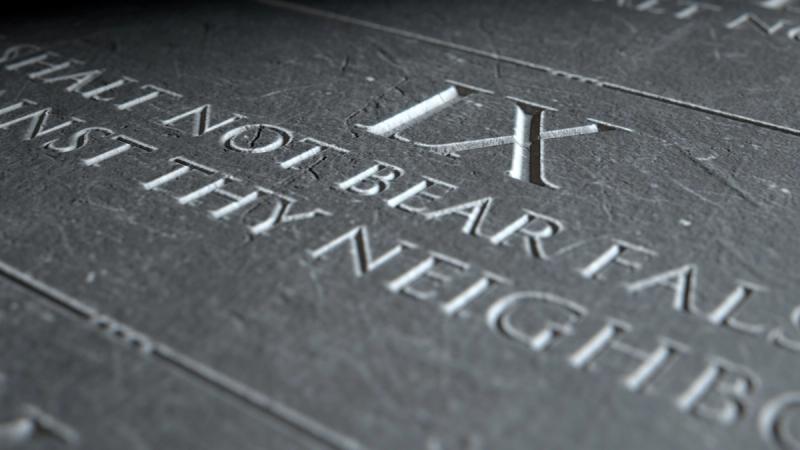The General Social Survey reports that only 30% of Americans agreed with the statement that “most people can be trusted.”[1] I think 70% percent of those surveyed gave an answer based on an honest assessment of their own hearts. We live in a world of deception, filled with deceivers—people just like you and me. We contribute to the societal phenomenon of “Truth Decay” through our own careless handling of the truth.[2] A columnist for Times once captured our problem well: “The injunction against bearing false witness, branded in stone and brought down by Moses from the mountaintop, has always provoked ambivalent, conflicting emotions. On the one hand, nearly everybody condemns lying. On the other, nearly everyone does it every day.”[3] It’s a thing we hate, but something we seemingly can’t stop doing. We want the truth. We need the truth. We prize it in our heroes, leaders, and politicians—though all fall short of attaining that threshold of honesty we are after.
The Agony of Deceit
This teaches us just how insidious that first lie ever uttered truly was, for we are still reeling the devastating effects from it today: “Did God really say…?” It was that Serpent’s twist of the truth that perhaps God was not all-good after all. When Adam and Eve embraced that lie, they let go of God, and plunged the whole world into sin and misery. That’s why Jesus rightly rebukes those who deny him by saying they belong to Satan, who has been lying from the beginning of time: “You are of your father the devil … When he lies, he speaks out of his own character, for he is a liar and the father of lies” (John 8:44). In a similar way, Paul can summarize the entire plight of the human condition by saying this: “they exchanged the truth about God for a lie” (Romans 1:25). Everyone who is or ever will be in Hell, will be there because they have been deceived. Deceit is deadly.
Scripture has a lot to say about falsehoods and the destructive power of a false witness. Lies can kill people, hence the injunction to protect the innocent in a court of law through the ninth commandment. Lies can also kill reputations—which is to be “chosen rather than great riches” (Proverbs 22:1). So David cries out in Psalm 104, “Be not silent, O God of my praise! For wicked and deceitful mouths are opened against me, speaking against me with lying tongues.” But the gravest warning the Bible gives about deception is that it has the capacity to destroy our souls.
The Triumph of the Truth
Is there hope for us, sinners who are so easy to be deceived and so ready to deceive? Is there a way of escape from the grip of falsehood, the danger and destruction of lies? The gospel story tells us there is. To hell-bound sinners, who have turned their backs on their Maker because they have embraced the lie of the Serpent, Jesus says in John 8: “The truth will set you free.”
But as the gospel story plays out, it seems almost for a moment like Jesus’ words were an empty slogan. He preaches about truth, He claims to be truth. And then what happens to Him? He dies! It seems as though the lie has triumphed over the truth! And it is significant that the crucifixion of our Lord was orchestrated through willful violations of the ninth commandment: “many false witnesses came forward” to see to it that he ended up on the cross (Matthew 26:60).
It seems like the lie wins. That truth has been triumphed. That Jesus’ invitation to be set free from the truth was well-meaning and attractive, but ultimately something he couldn’t follow through on. But if the cross seems to be the victory of Satan and his lies over Christ and his truth, the resurrection and the empty tomb prove something far different. Is it any wonder that Jesus says He is the truth, and immediately afterwards says He is the life (John 14:6)? His resurrection life is His vindication against the lies of Satan and a sinful world. The truth was, is, and will always be more powerful than the lie. But Christ succumbs to the destructive power of a false witness, even to the point death, for the purpose of saving us from that very power. Robed in resurrection glory, when we behold our risen Savior we see what He has won for us: a redemption from the grip of sin, including the sin of deceit.
We get to know His truth in experiential, life-transforming ways as believers. Because the true Son of God sends into our hearts the very One He calls “the Spirit of truth” (John 16:13). That’s what we need, isn’t it? We know lying is wrong, and yet we do it all the time. Here’s how we can begin to stop: by receiving the Spirit of truth. He will give us a greater love for the truth, a greater desire for the truth, a greater conviction about speaking the truth ourselves. The Spirit will bring to us a remembrance of how the truth triumphed over the lie at the cross: how the redemptive power of Christ’s true witness absolutely crushed the destructive power of the false witness. We will be more convinced of the power of truth, and ready to rely on it when we would otherwise be tempted to lie.
The Power of a Faithful Witness
The Spirit of Truth will aid us and enable us in our commission to be witnesses. If we are to care about the truth, it certainly means we must heed Christ’s call to be true witnesses to His person and work throughout all the world. That can be a scary thing, and an increasingly unpopular thing. But it’s an important thing.
How are we to be faithful and truthful witnesses of Jesus to the world? We can’t do it on our own—we would utterly fail as faithful representatives of Jesus. But it’s fascinating to know that the Holy Spirit’s role, in part, is to be that perfect witness. Jesus says, “But when the Helper comes, whom I will send to you from the Father, the Spirit of truth, who proceeds from the Father, he will bear witness about me” (John 15:26). He bears witness perfectly about the Son because they are one in the communion and union of the godhead. We have the perfect witness of Christ in our hearts—what courage that should give us for spreading the truth!
And there is a redemptive power in our faithful witness to Christ. By God’s design when we bear witness to others about who Jesus is, they are saved. Wretches and lost sinners are brought into God’s kingdom through our witness-bearing! People are snatched from the deadly grip of deception when we profess and proclaim the truth.
Let that be our motivation to embrace the truth in a day and age when the popular thing is to reject it. Let us welcome others to Christ, for if they are not already, they will soon grow weary of the emptiness of a world built on flattery, backbiting, and fake news. Let us offer Christ to those who are sensing the danger of the lies they have been living. In a world that is nothing if not faithless and false, let us cling to the redemptive power of He who is called “Faithful and True” (Revelation 19:11).
Jonathan Landry Cruse is the pastor of Community Presbyterian Church in Kalamazoo, Michigan, and an author. His newest book, from which this article is adapted, is What Happens When We Worship, published by Reformed Heritage Books, and is used here with permission. He is also a hymn writer whose works can be found at www.HymnsOfDevotion.com.
[1] https://ourworldindata.org/trust#country-specific-surveys
[2] Defined by these four trends: “an increasing disagreement about facts and analytical interpretations of facts and data; a blurring of the line between opinion and fact; an increase in the relative volume, and resulting influence, of opinion and personal experience over fact; and lowered trust in formerly respected sources of factual information.”https://www.rand.org/pubs/research_reports/RR2314.html
[3] http://content.time.com/time/subscriber/article/0,33009,976641-3,00.html




